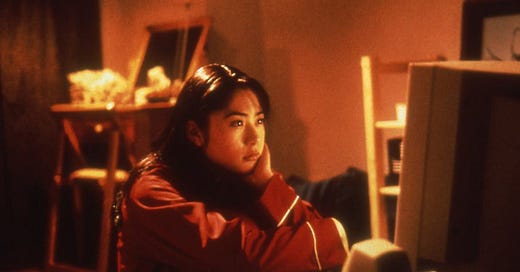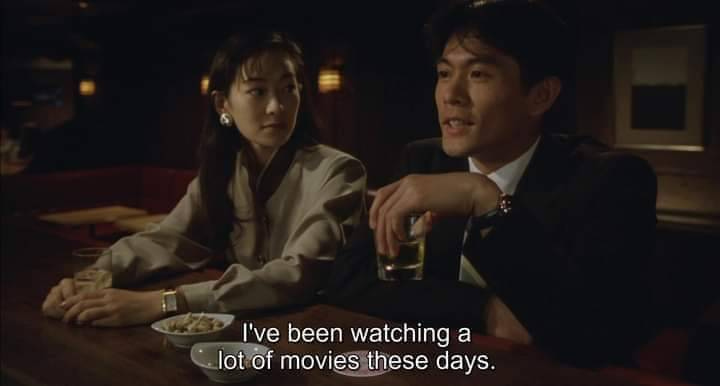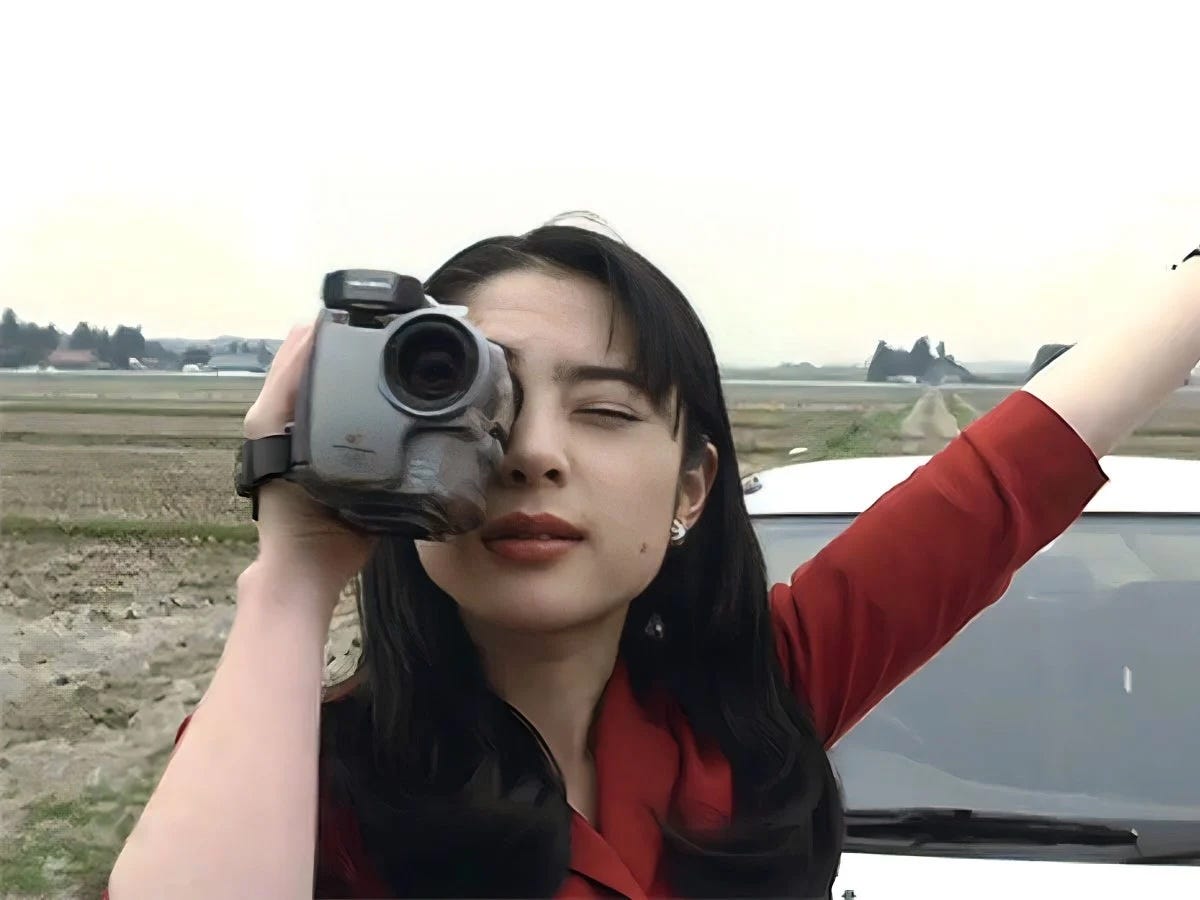A Time Capsule of Connection: Haru and the Internet’s Bittersweet Innocence
In our quest for digital solace, perhaps Haru's bittersweet innocence is actually less a relic of the past and more a blueprint for our future.
It’s 4 PM. I finally get home, kick back my slippers, and use my right toe to quiveringly hit my desktop computer's “power” button. I sign onto MSN Messenger, and see my crush is online. Frenzied, I write a cryptic caption next to my online name. From there, I log off and on, timed in perfectly succinct 2-minute intervals, desperately waiting for my to-be beloved to notice me and spark up a chat. When he doesn’t, I feel dejected but migrate to the next quick dopamine hit I can find: changing the MySpace song that plays when friends visit my page. I feel alone, yet desperately seeking to be seen.
When thinking about the first film-related post to be published on Rewind & Revive, I was salivating with options. Then it dawned on me: I want this publication to be a space to revisit films from the past with fresh eyes. What better movie to start with than Yoshimitsu Morita’s Haru from 1996? After all, what drew me to it was the fact that it’s a film so profoundly of its time, and yet, it’s also oddly timeless, reflecting both on the simplicity and growing sense of isolation in the digital world.
There’s a bittersweet duality in Haru: the warmth of human connection behind a screen, the all-encompassing disconnect within such a connected world, and the molding of our online personas — not out of malicious deception but out of a desire to be more — to become the person you long to be.
Haru was released during the internet’s infancy, before the days of MySpace, MSN Messenger, Habbo Hotel (yikes, remember that?), Facebook, and decades before Instagram and TikTok catapulted social media into the behemoth it is today. Making its debut two years before Nora Ephron’s You’ve Got Mail (which in itself is inspired by Ernst Lubitsch’s Shop Around the Corner from 1940), Haru captures those confusing first few years of internet chat forums when folks were still adjusting to the concept of instant messaging. Where Ephron’s film is a feel-good, optimistic look at the dot-com boom, Morita’s effort is reflective and somber, emphasizing the growing disconnect in this new digital world. You’ve Got Mail is a romantic escape, while Haru asks us to reflect on what lingers just beyond the reach of connection.
The film starts by introducing us to a Tokyo businessman (Seiyo Uchino) who decides to go by the online alias “Haru.” Not exactly a full-fledged cinephile just yet, Haru is still in the nascent stages of his film-watching journey, yet eager to absorb as much as he can. He joins an online movie chat room that, at the start, is seemingly filled solely with men (the way Haru predicts the exchanges found on FilmTok had me speechless). Immediately, I smiled at the discourse, tenderly reminded that, although Haru came out almost three decades ago, the way we interact and discuss cinema with our peers hasn’t changed all that much, if at all.
Through Haru’s introductions to the group, another member stands out: “Hoshi” (Eri Fukatsu), a user who is curiously more sensitive than the others. Hoshi is a wealth of filmic knowledge compared to Haru, and soon enough, they privately email him, which begins their correspondence. “Nice to meet you. It’s Hoshi from the film forum,” they write, adding, “Looks like you’re still new to online chatting. At the beginning, there may be some things that take getting used to, like selfish people saying nasty things … Being exposed to other people’s way of thinking was a learning experience for me.” Sound familiar? I know, for me, this is something I’m still getting used to, and I found a strange comfort in the realization that online trolls existed even way back when. If you want to make it to the other side, sometimes you must pay the bridge troll’s toll.
Their conversations, which start with their joint explorations of film, soon evolve into musings about their lives, struggles, and mutual feelings of alienation. We then discover that Hoshi is a young woman, although she urges Haru to keep this a secret after telling him. This cues another lasting line: “I wouldn’t be able to handle the flood of e-mails. It’s not unusual for people to harass you as soon as they find out you’re a woman.” Along with resonating to this day, the statement also somewhat echoes a plot point that follows Hoshi’s life off-screen – it’s one that I won’t spoil today.
Morita cleverly forces the reader to, well, read the exchanges we see on screen. Occasionally, he’ll overlay Hoshi and Haru’s chats over scenes of what their lives are actually like, but by and large, we open the emails with them, eagerly hanging on to each word.
Hilariously enough, we soon discover that both of these cinephiles create little white lies – from conversations surrounding their dating lives to the films they actually haven’t seen. As another character wisely shares later on, “Don’t we all lie on the internet at one point?”
There are moments when we watch both of these lonely souls type brave paragraphs, baring their hearts… only to delete them in hesitation. Eventually, their desire for intimacy grows so intensely that the uncertainty evaporates. After all, when you’re a voice behind a screen, what do you really have to lose?
And yet, as they eventually (and sheepishly) admit to their follies, the other is right there, offering the comforting support of a cheerleader on a digital highway. Within this exists the duality of the internet I highlighted above: we can be whoever we want to be – just be careful not to let your online persona engulf who you truly are. For Haru and Hoshi, the safety of one another’s words blossoms into a sense of belonging – a belonging so strong that it offers a more encompassing sense of connection than the ones that they have when they power down their computers. We heal by being vulnerable, and when used correctly, these digital exchanges can lead to lifelong friendships and, sometimes, even the most gentle and intimate bonds.
Yoshimitsu Morita was a prolific Japanese filmmaker, having directed just over 30 films across a three-decades-long career. Within his catalog, he seemingly did it all: melodramas, pinku eiga (which he started off with), mysteries, and comedies – including the beloved social satire The Family Game in 1983. Haru, which came in the latter half of his career, was also released after a string of less successful projects and a four-year hiatus. To debut something as daring as Haru, which at times can feel like a visual novel, was an undeniable risk. Yet, by capturing the simple yet profound interplay between the mundane routines of urban young adults and their intimate inner lives, he truly hit the jackpot.
Haru may be a relic – a bittersweet reminder of the internet’s nascency. But really, how much has changed? As we’ve made bewildering leaps and bounds in the world of technology, we somehow appear to be lonelier than ever. It seems like the pendulum is swinging again, and we’re finally craving something more. We’ve had our bellies full for so long with the instant gratification by way of likes and follows that we now wish to go back and seek exchanges akin to those in Haru – a more sincere sense of community by way of long-lasting, meaningful connections. As I’m writing even this, I’m enveloped by the warm realization that long-form content is making a resurgence. So, I’ll leave you with this: When crafting your own digital altar, what are you truly searching for?
In our quest for digital solace, perhaps Haru’s bittersweet innocence is actually less a relic of the past and more a blueprint for our future: a reminder that while technology evolves, the yearning for genuine intimacy remains timeless.
On that note, I’m signing off and leaving you with the simple greeting that sparks the perennial bond of our heroes in Haru:
Nice to meet you (^ ─ ^)








“WHEN CRAFTING YOUR DIGITAL ALTAR, WHAT ARE YOU SEARCHING FOR?”!!! Deceased! Genius 🥹😭
I think this movie sprained my soul 😢